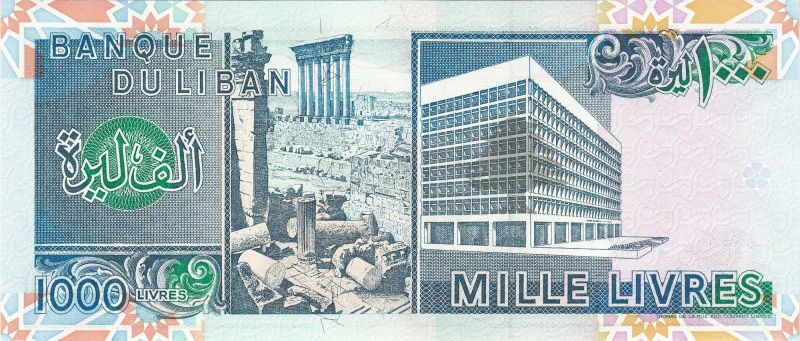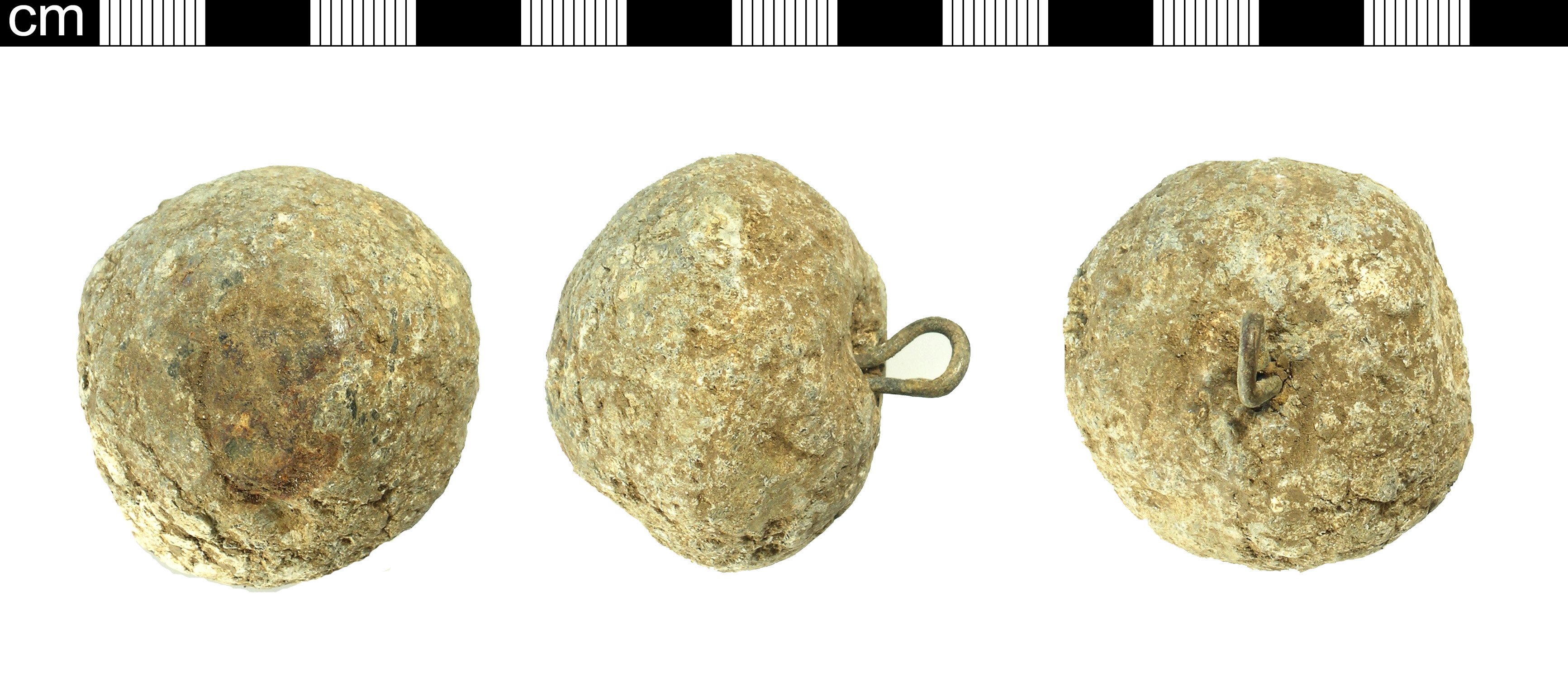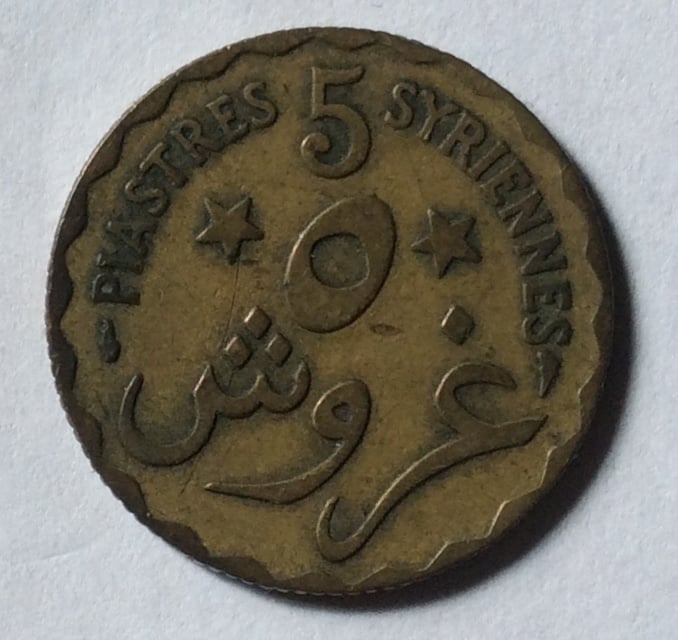
Lebanese banknote. (Courtesy Wikimedia Commons)
The lira libnaniyya (or, lebnaniyeh, if you prefer) might be on its deathbed.
After four years of brutal depreciation, economists say it has lost its role as a store of value. As a medium of exchange, it is jostling up against the US dollar, which has been spreading from restaurants and generator bill collectors into pharmacies and supermarkets.
The dual use of dollars and lira is increasing. Some dollar-holding consumers use lira merely as change for larger dollar denominations, since $1 and $5 bills are relatively less common in Lebanon compared to the larger bills.
As commentary on the lira pours forth, there’s still no agreement on how to translate its name into English.
Many English speakers and publications, aside from L’Orient Today, don’t call it the lira at all, preferring instead the word “pound” and the abbreviation LBP (or, more rarely, £L).
The term “pound” was even formalized by the International Organization for Standardization (ISO) in 1978, which issues three-letter codes for currencies (think USD, GBP, and EUR). The ISO generally uses a two-letter country code followed by the first letter of the currency’s name so the Lebanese Pound gives LBP.
This is despite the fact that the 1963 Code of Money and Credit officially defines the Arabic abbreviation for lira libnaniyya as «ل.ل.», that is, the Arabic character “lam,” making the “l” sound, or “L.L.”
Why the two different names? They’re not so different it turns out.
‘All roads lead to Rome’
In the Roman Empire, there was a unit of weight measurement called the libra pondo, equal to about 329 grams. The word libra literally means “balance”—think of the scales used to represent the zodiac sign—and pondo is an adverb meaning “by weight.”
 A steelyard weight, an ancient Roman unit of measurement. (Courtesy Wikimedia Commons)
A steelyard weight, an ancient Roman unit of measurement. (Courtesy Wikimedia Commons)
The word libra also came to be used in a monetary context after the Roman Emperor Constantine (272–337 CE) introduced a unit equal to one pound (libra) of gold.
From Latin, the word pondo entered proto-Germanic and eventually English as a unit of weight. Since the value of most premodern currencies was determined by their weight in silver, gold, and other precious metals, the cumulative weight of 240 silver pennies became the English unit of currency known as a pound around 775 CE.
Medieval Latin writers in England, however, called the currency libra while the contemporary (Frankish) Carolingian pound was known in Latin as pondus Caroli.
By one account, French also took the first word in the Latin equation, deriving livre from libra, which Italian traders then modified to lira. Alternatively, it’s possible that Italian took lira directly from Latin, instead of from French, since they had previously minted libra venetialium (a pound of Venetian pennies). The first money to be called lira was minted in Venice in 1472.
Traders from Venice were highly active in the Levant and Venetian lira were popular in Eastern Mediterranean trade, which may have spread local usage of the word.
The lira became the official currency of Ottoman Lebanon and Syria in 1844, when the Ottoman Empire adopted it to replace the kurush, which derived its name from the French gros, meaning “heavy,” since it had a larger weight of silver than the even older, debased Ottoman akce.
Despite being replaced by the lira as the major unit of currency, the kurush would survive for another two hundred years in the Levant as a subunit of the lira known in Arabic as the qirsh. The Lebanese 1963 Code of Money and Credit defined the qirsh as 1/100th of a lira, but it long ago fell out of usage due to inflation.
 A 1924 five qirsh coin. Up until 1968 qirsh was spelt with an initial ghayn, which was changed to qaf. Qirsh coins were last issued in 1980. (Courtesy Wikimedia Commons)
A 1924 five qirsh coin. Up until 1968 qirsh was spelt with an initial ghayn, which was changed to qaf. Qirsh coins were last issued in 1980. (Courtesy Wikimedia Commons)
English-speaking foreigners were aware of the Turk’s preferred word for their currency, lira. The term appears in English in reference to the currency as early as 1865, but it competed with the translation to pound, which can be found as early as 1857 in The Times of London. In French, both the British pound sterling and the Turkish lira were, and are, known as livre.
Al-lira al-libnaniyya al-suriyya and its descendants
In the Levant, after the Ottoman Empire lost control and the French took over, the lira remained. But, starting in 1920, it refered to al-lira al-suriyya (the Syrian lira) and, after 1924, al-lira al-libnaniyya al-suriyya (the Lebanese-Syrian lira)—a currency pegged at a value of 20 French francs.
This currency, known in French as La livre libano-syrienne, would eventually give birth to the liras of independent Syria and Lebanon, which remained interchangeable until a final monetary divorce in February 1948.
Google Books’ Ngram viewer, which counts mentions of words in a large body of scanned texts, indicates that, from the invention of the currency in 1920 until today, pound has outpaced lira in English writing on Lebanon’s currency.
The same can’t be said of its Turkish cousin, however.
The post-Ottoman Turkish state kept the lira name, with kurush subunits. English-language writers continued to favor the word pound for decades until, for some reason, in the early 1940s pound suddenly fell out of fashion and the currency was henceforth referred to by its local name only. The same has never happened with Lebanon’s lira libnaniyya.
By any name, the Lebanese lira remained pegged to the franc until 1949, except for a brief interlude during World War II when it was pegged to the British Pound. Fifty years later, the use of a peg would return in December 1997, this time at a value of LL1,507.5 to the US dollar. That peg was abandoned in February 2023.
The rest is history, which we are now, unfortunately, living.